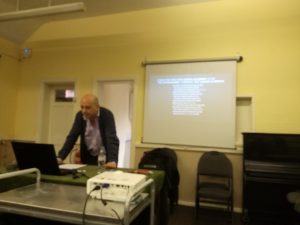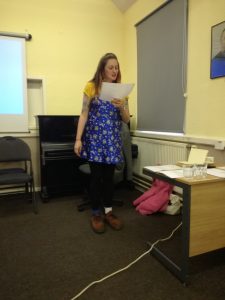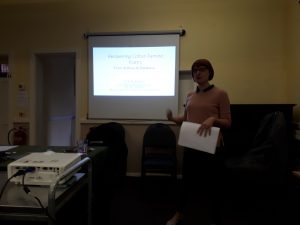We’re officially launched!
Last weekend, we were delighted to be able to tell members of the public (who braved the miserable weather to join us at the Working Class Movement Library in Salford) about the project and to treat them to a fantastic performance by our project partner Jennifer Reid.
Simon started proceedings with an outline of the project, explaining the historical background as well as how he first encountered the poetry of the Cotton Famine thanks to BBC Radio 4’s In Our Time. He also gave us a couple of brief readings, including Williffe Cunliam’s fantastic ‘Settlin’ Th’ War’, a fabulous satirical poem in dialect, which mocks the Burnley locals who stood around discussing the state of affairs in America wishing they’d “hurry up, un settle th’ war.” It’s a great poem to highlight the way that the Cotton Famine was a local crisis caused by global events, since Cunliam shows how well-versed Lancastrian people were in the news from America, and situates them in a very local place (Nuttall’s Corner) as they comment on issues over which they had little control. Williffe Cunliam is also a previously uncelebrated (perhaps unknown?) poet, but Simon has been able to trace a William Cunliffe in Burnley who may well fit the bill of our pseudonymous author. This is one of the really exciting elements of the project – the potential to discover poems and poets who deserve much greater recognition and to bring them to wider public attention.
After Simon had finished up with a summary of our planned collaboration with Lancashire schools, I took over to offer more detail on the process of finding the poems and preparing them for publication on our database. I demonstrated some of the difficulties we encounter, particularly where the quality of microfilm images or of the original newspapers themselves makes reading difficult or even impossible. Though the archivists and librarians who look after the newspaper collections we use work hard to preserve them, some damage has occurred before the items were archived, and both newspaper and microfilm necessarily degrade over time. We hope that by making as much of the poetry as possible available – as fragments if necessary – we can help to ensure that they continue to survive in spite of this, and remain accessible for as many people as possible. I finished my talk by explaining the process of transcription and text markup that we use to prepare the poems for digitisation, which also helps us to analyse the poems and highlight their particular features.
After a quick break for brews and biscuits, we resumed with performances of the poems by ‘the pre-eminent broadside balladress of the Manchester region’, Jennifer Reid. Jennifer really brings the poems to life with lively renditions that really demonstrate the way dialect poets animated different characters and found humour even in bleak situations. In the days before TV or radio, these kind of performed poems and songs would have provided much-needed entertainment in working-class communities, and transferred a knowledge of poetry beyond those who were literate to their family and friends, so we love being able to recreate this performative aspect. Jennifer is also a mine of knowledge on Lancashire dialect and ballad traditions, with a vast repertoire of local songs at her disposal – if you do get chance to see her perform, we highly recommend you go along!
We’d like to offer huge thanks to the Working Class Movement Library for hosting us and for providing refreshments, as well as to everyone who came along and took such interest in the project. We hope to do many more events over the coming months, so please do get in touch if you are interested in hosting a talk about the project. For news on upcoming events, please follow us on social media (links below) or drop us a line to be added to our forthcoming email list.
Dr Ruth Mather
https://twitter.com/CottonPoetry
https://www.facebook.com/cottonfaminepoetry/

dav

dav
